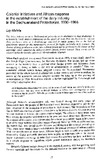| dc.contributor.author | Mafela, L. | |
| dc.date.accessioned | 2011-02-21T13:27:28Z | |
| dc.date.available | 2011-02-21T13:27:28Z | |
| dc.date.issued | 1999 | |
| dc.identifier.citation | Mafela, L. (1999) Colonial initiatives and Afreican responses in the esdtablishment of the dairy industry in the Bechuanaland Protectorate, 1930-1966, Pula: Botswana Journal of African Studies, Vol. 13, No. 1&2, pp. 77-92 | en_US |
| dc.identifier.issn | 0256-2316 | |
| dc.identifier.uri | http://hdl.handle.net/10311/699 | |
| dc.description.abstract | The dairy industry arose in Bechuanaland primarily as an alternative to beef production in response to South Africa's restrictions on the import of cattle from the Protectorate African dairy producers were at a disadvantage compared to settler farmers due to the lack of government support for the infrastructure essential for highly perishable dairy produce The decline of dairy production in the later colonial period can be attributed to the revival of beef exporting, which undercut the Administration's already limited interest. These events can be situated within the broader pattern of colonial underdevelopment. | en_US |
| dc.language.iso | en | en_US |
| dc.publisher | Research and Development Unit, University of Botswana http://www.thuto.org | en_US |
| dc.subject | Dairy industries | en_US |
| dc.subject | Bechuanaland Protectorate | en_US |
| dc.subject | Farmers | en_US |
| dc.title | Colonial initiatives and Afreican responses in the esdtablishment of the dairy industry in the Bechuanaland Protectorate, 1930-1966 | en_US |
| dc.type | Published Article | en_US |

